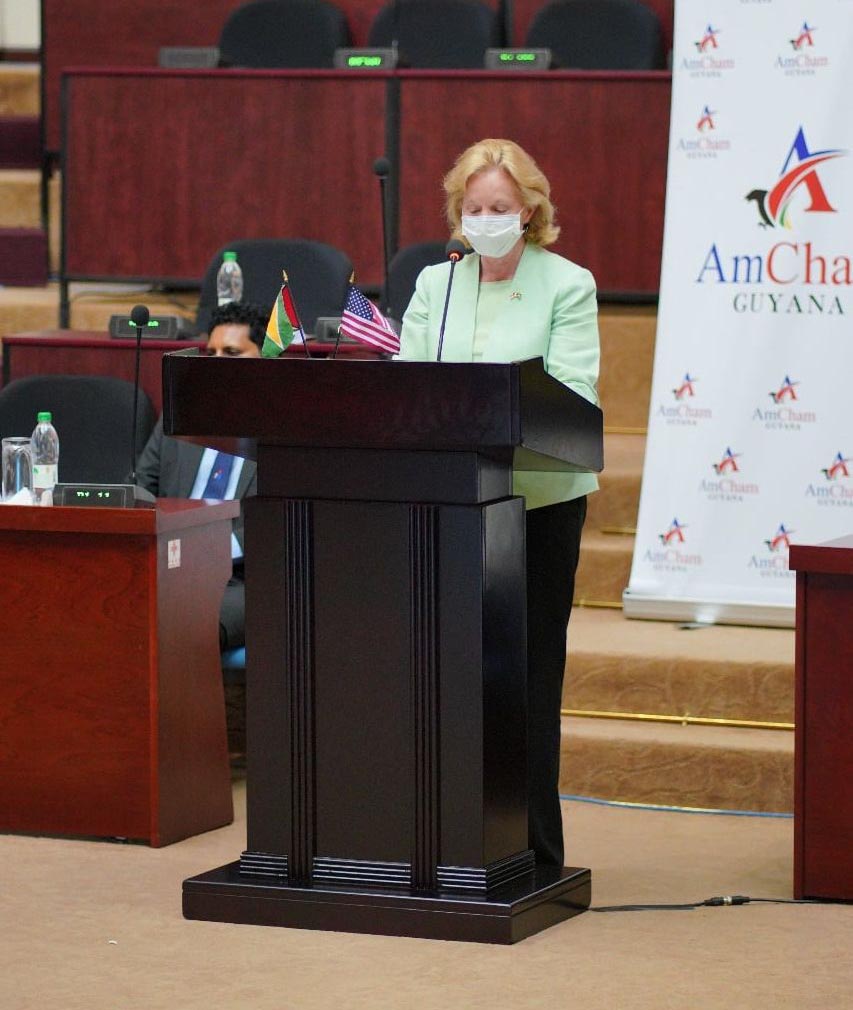
US Ambassa-dor to Guyana Sarah Ann-Lynch
September 3 ,2021
US businesses flocking Guyana to cash in on investment opportunities continue to complain of the lack of a business-friendly environment.
Delivering remarks at the American Chamber of Commerce (AmCham) general meeting on Wednesday, US Ambassa-dor to Guyana Sarah Ann-Lynch explain-ed that the embassy has received numerous reports of the challenges businesses continue to face.
“Some U.S. businesses report lengthy timelines for permits, uncertain approval processes, and concerns about procurement procedures even when they follow the submission guidelines to the letter,” she said.
Lynch pointed out that traditional barriers to growth like high energy costs, aging roads, bridges, and other critical infrastructure, require investment and modernisation.
She suggested that if these challenges are swiftly addressed it could significantly improve the ease of doing business in Guyana and unlock an economic boom with accelerated growth in the manufacturing and value-added agricultural sectors.
In the preceding two years, Guyana was ranked at 134 in the World Bank’s Ease of Doing Business Index, which highlighted that it could take up to 208 days to get a construction permit, 82 days to get electricity, and 46 to register a property.
Upon taking office, Chief Investment Officer Peter Ramsaroop of Guyana’s Office for Foreign and Local Investment (G-Invest) had said that it was his agency’s mission to cut bureaucratic red tape and encourage ease of business.
“We are going to be proactive… there are many opportunities here and G-Invest becomes that first focal point – a place that investors come and will be guided and steered on all that is needed for their projects to become reality,” Ramsaroop said.
Further, the ambassador stated that focus should be placed on digitalising the public procurement process and adapting to internationally recognised best practices to securing higher quality bids. A move, she said, that will create a level playing field for aspiring Guyanese firms and US businesses to compete for critical infrastructure projects.
Additionally, she posited that local content and partnerships will set the tone for transitioning Guyana’s development agenda.
To avoid the resource curse, Guyana is correct in implementing guard rails that legislate investing in the country’s workforce, empowering Guyanese to innovate, developing capital markets, and growing its industries, she said.
The US Ambassador noted that the local content policy along with careful investment from the Natural Resource Fund has the potential to foster opportunities for all Guyanese and benefit the country as a whole.
The policy, she underscored, if done correctly can serve as an incentive to form partnerships and joint ventures that enable both US and Guyanese firms to not only share expertise and best practices, but also profits across many sectors.
Lynch said that moving into 2022, the US government and the US private sector are looking forward to a finalised local content policy (LCP) and amended Natural Resource Fund (NRF) legislation that sets a realistic path forward.
“The local content policy should strike a balance between protecting Guyana’s human capital while also creating a welcoming atmosphere for international investors to spur innovation and offer new products and services,” she emphasised.
Guyana’s LCP has been in the draft stage for several years and is awaiting finalisation before being transformed into law. As of February, citizens were invited to share their views and expectations of what the policy should contain and deal with.
The LCP is integral to the management of Guyana’s oil production sector, which is being operated by foreign companies. To guard against Guyanese not having a fair chance in the sector, the policy will ensure companies engage locals where necessary to meet their objectives.
Most of the high tier petroleum engineering and other technical jobs are taken by non-nationals as this country lacks the skillsets needed for these tasks. And while oil was discovered over five years ago, it is unclear when many of the technical jobs and specialist procurement opportunities will be taken up by locals.
“The Goal of this Local Content Policy (LCP) is to maximize the level, quality, and benefits of participation in the petroleum sector value chain by Guyanese,” the document, uploaded on the Ministry of Natural Resources website states.
“This will require improving the capacity of Guyanese and their businesses, institutions, and governance, in a manner that allows the country to enhance existing sectors of the economy and add new and emerging ones so as to support national sustainable development. It is the government’s intention to use these as a springboard for Guyana’s transformation into a sustainable and low carbon economy,” it adds.
Notwithstanding the policy is still to be finalised, Ambassador Lynch pointed out that US companies are still moving ahead with investments in the Guyanese people, whether it is short term or long term.
She said apart from businesses, educational institutions are also seeking to get a foot in the Guyanese market as she announced that the Lone Star College out of Texas will be signing a Memorandum of Undertaking (MoU) with AmCham to explore partnering on higher education opportunities.
